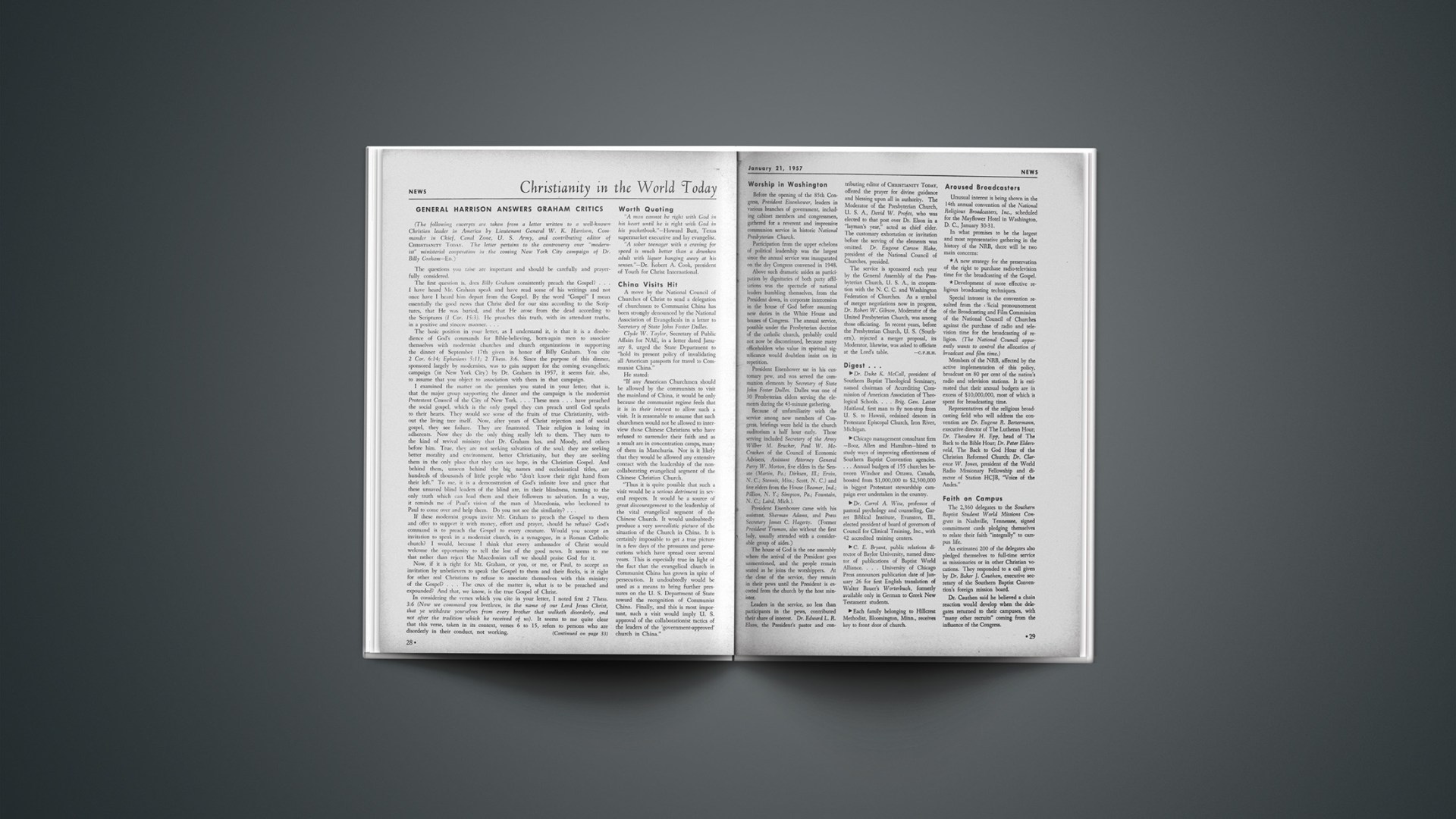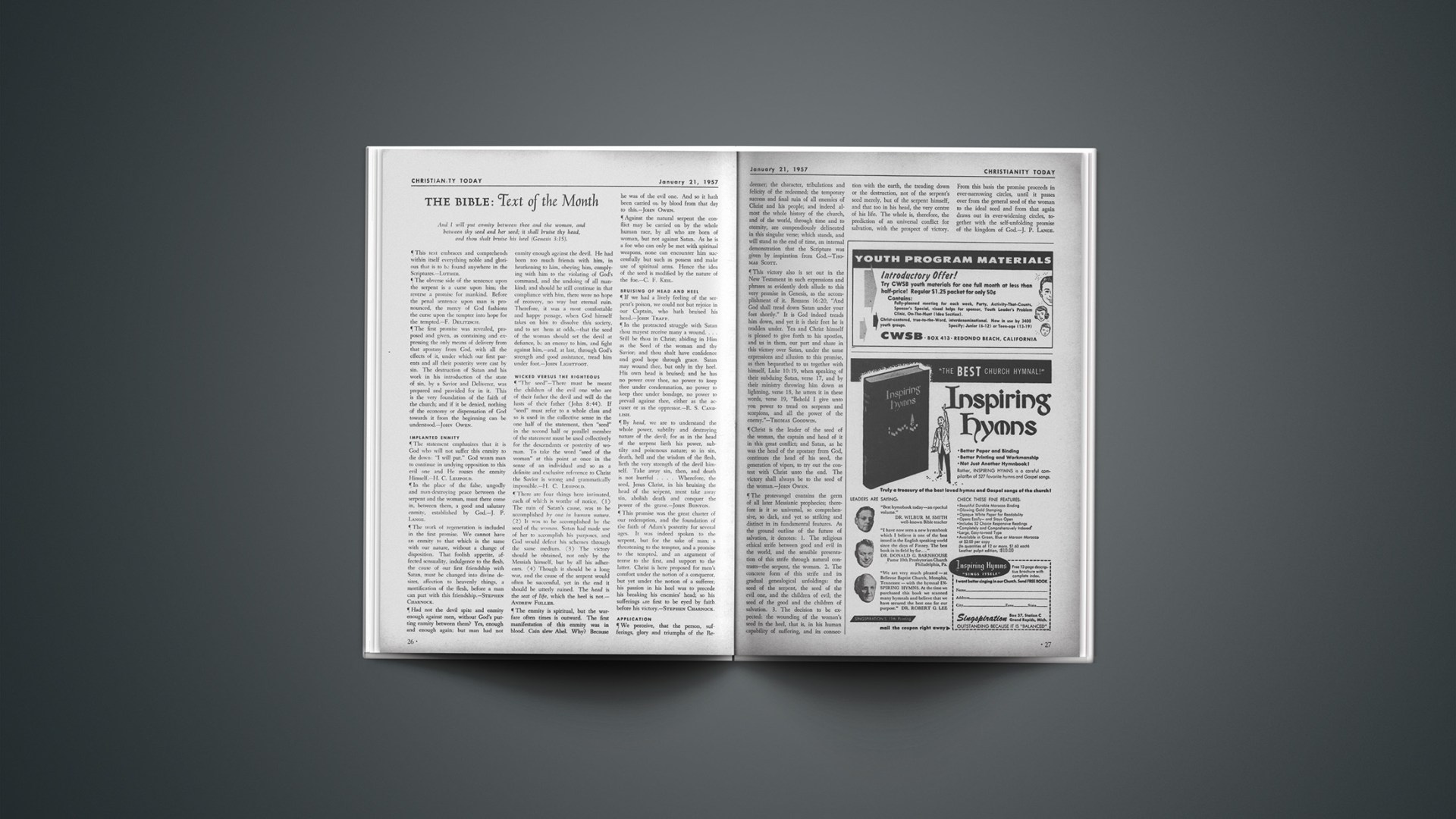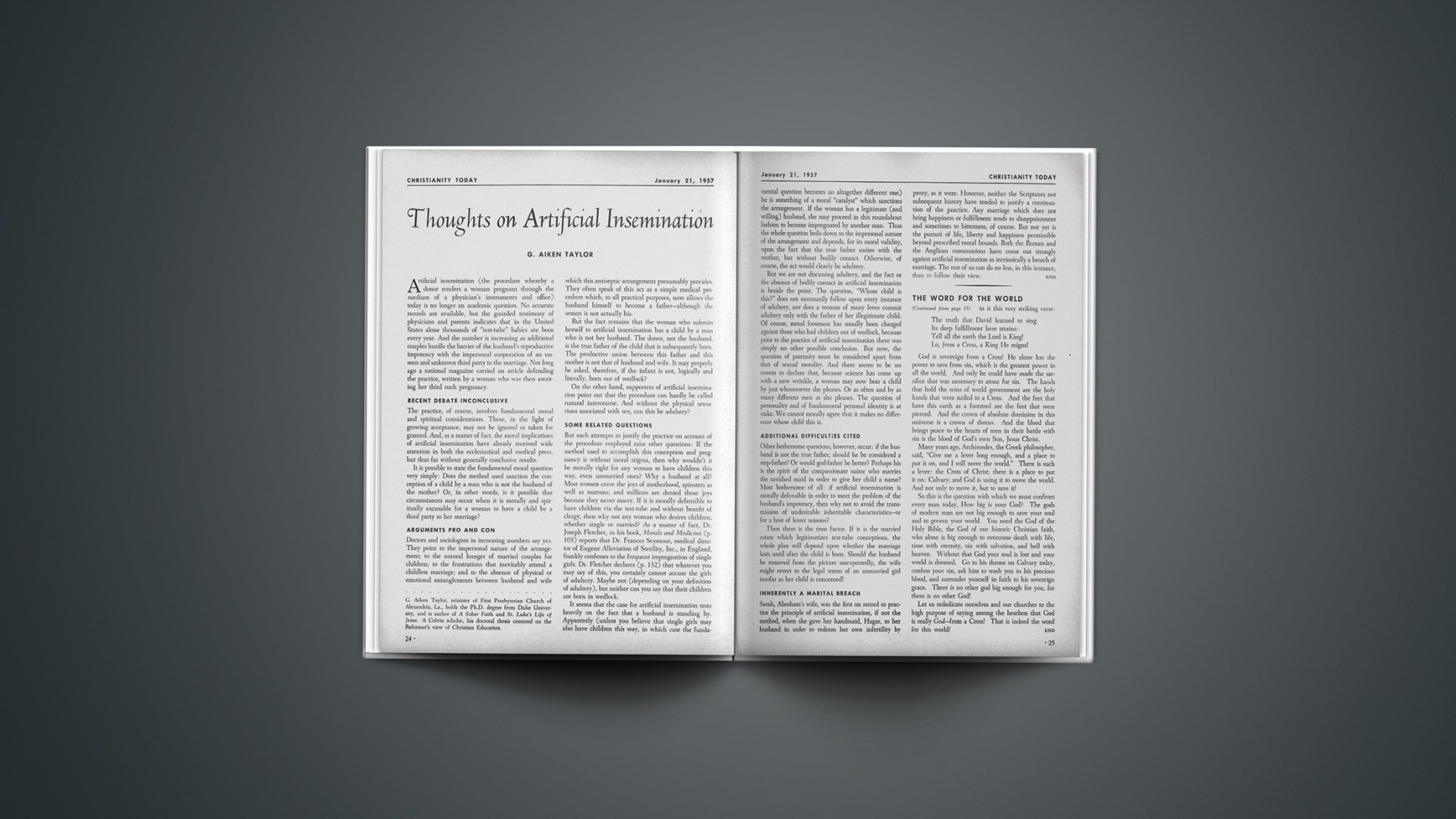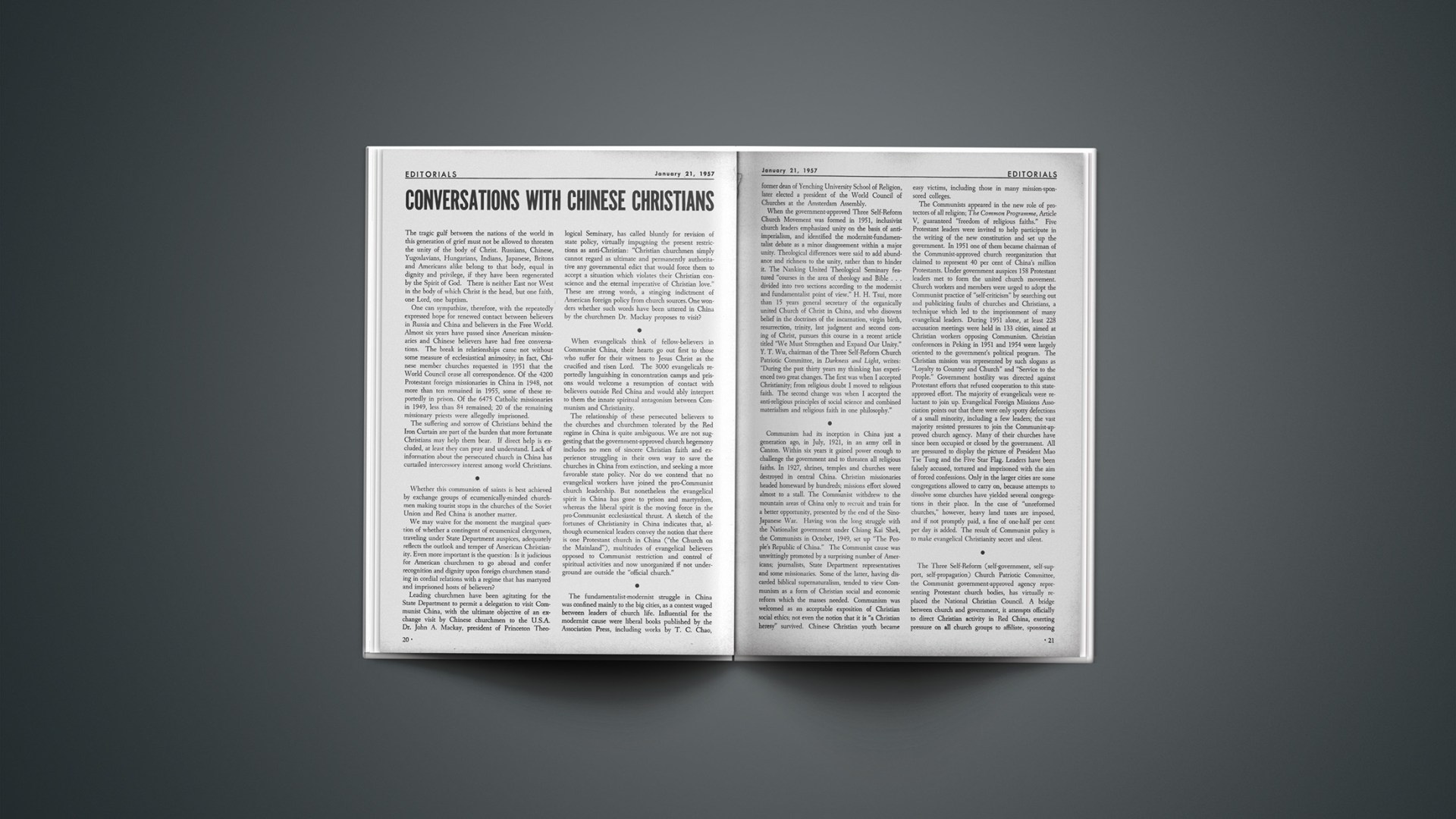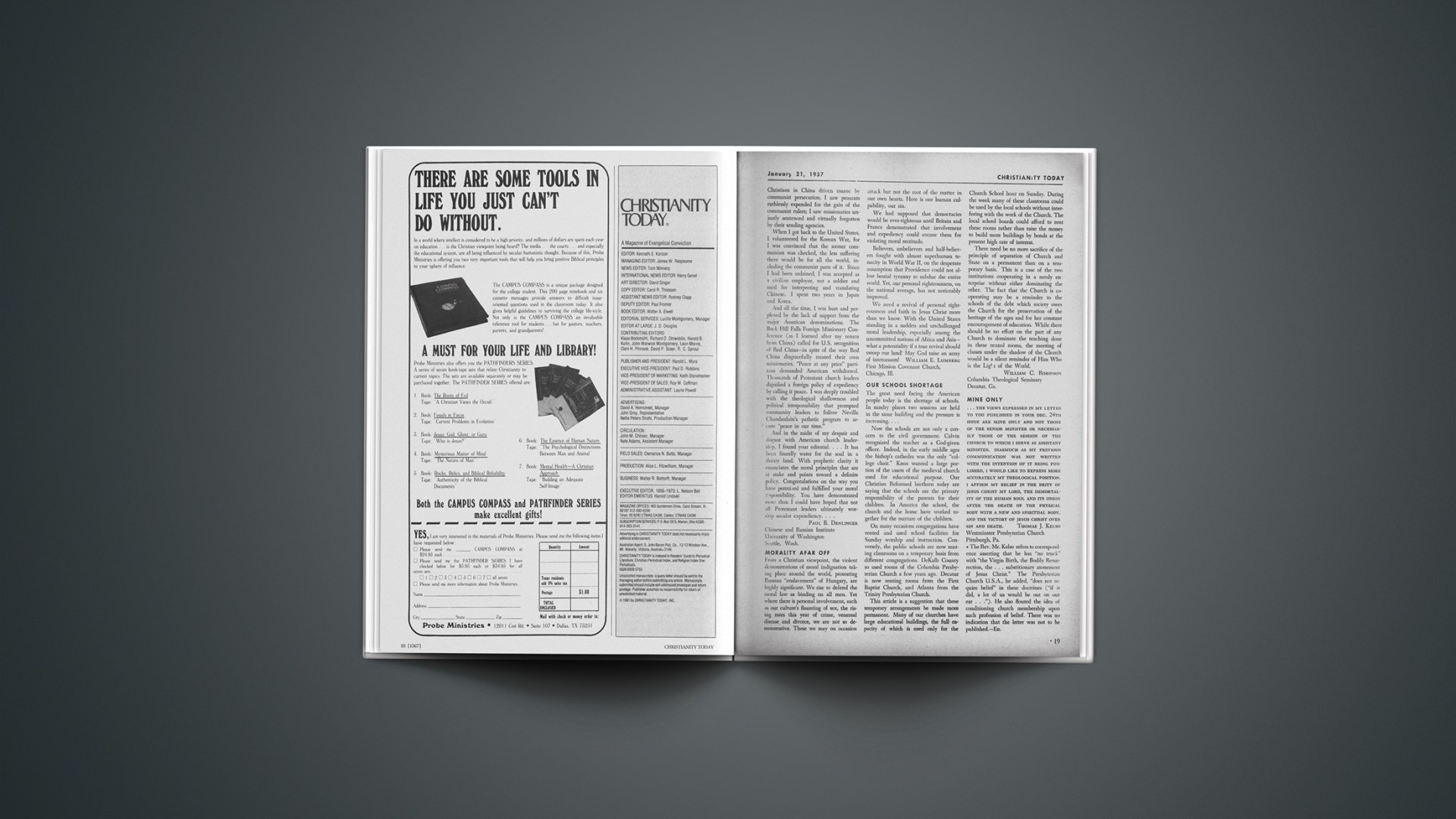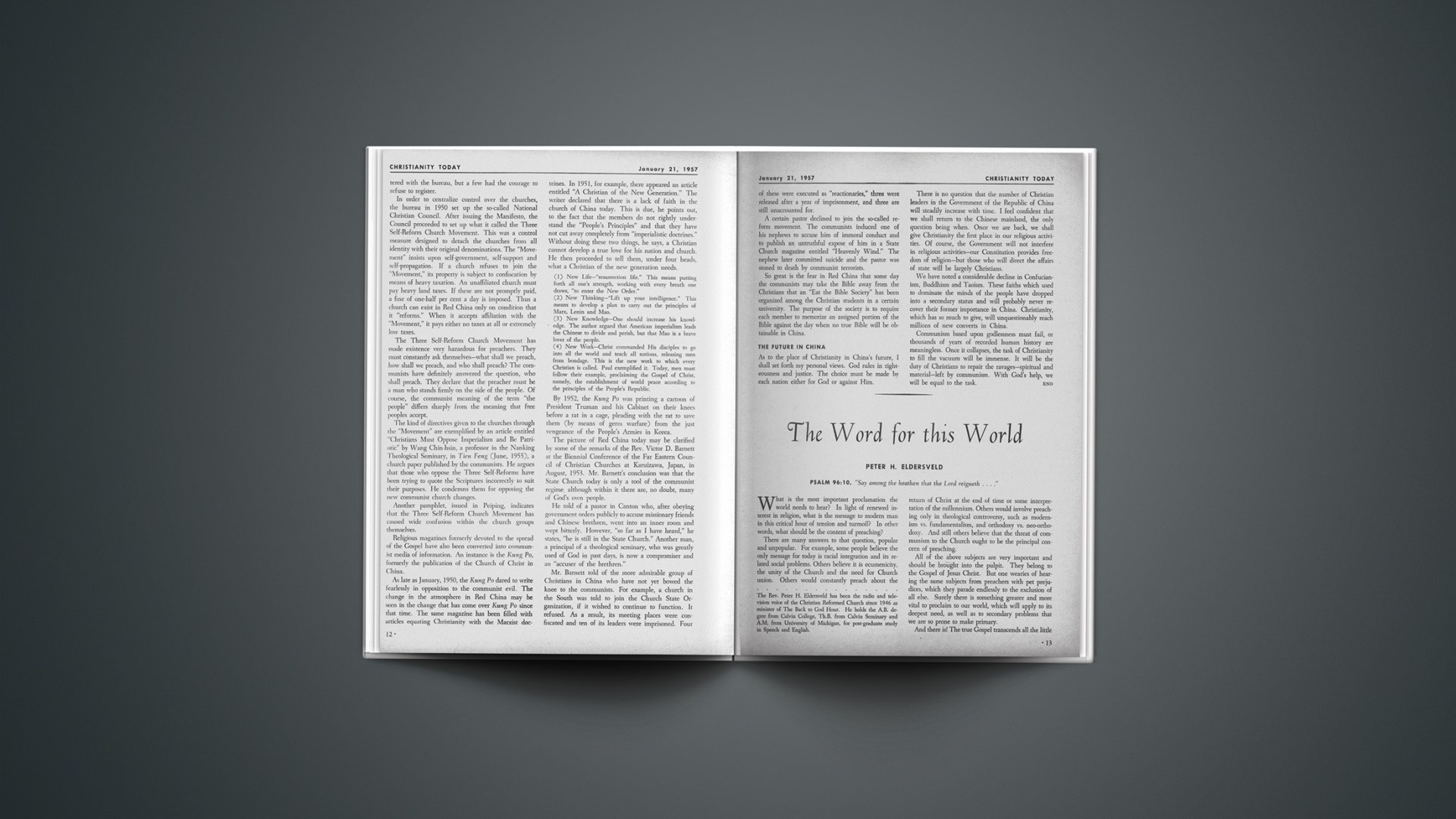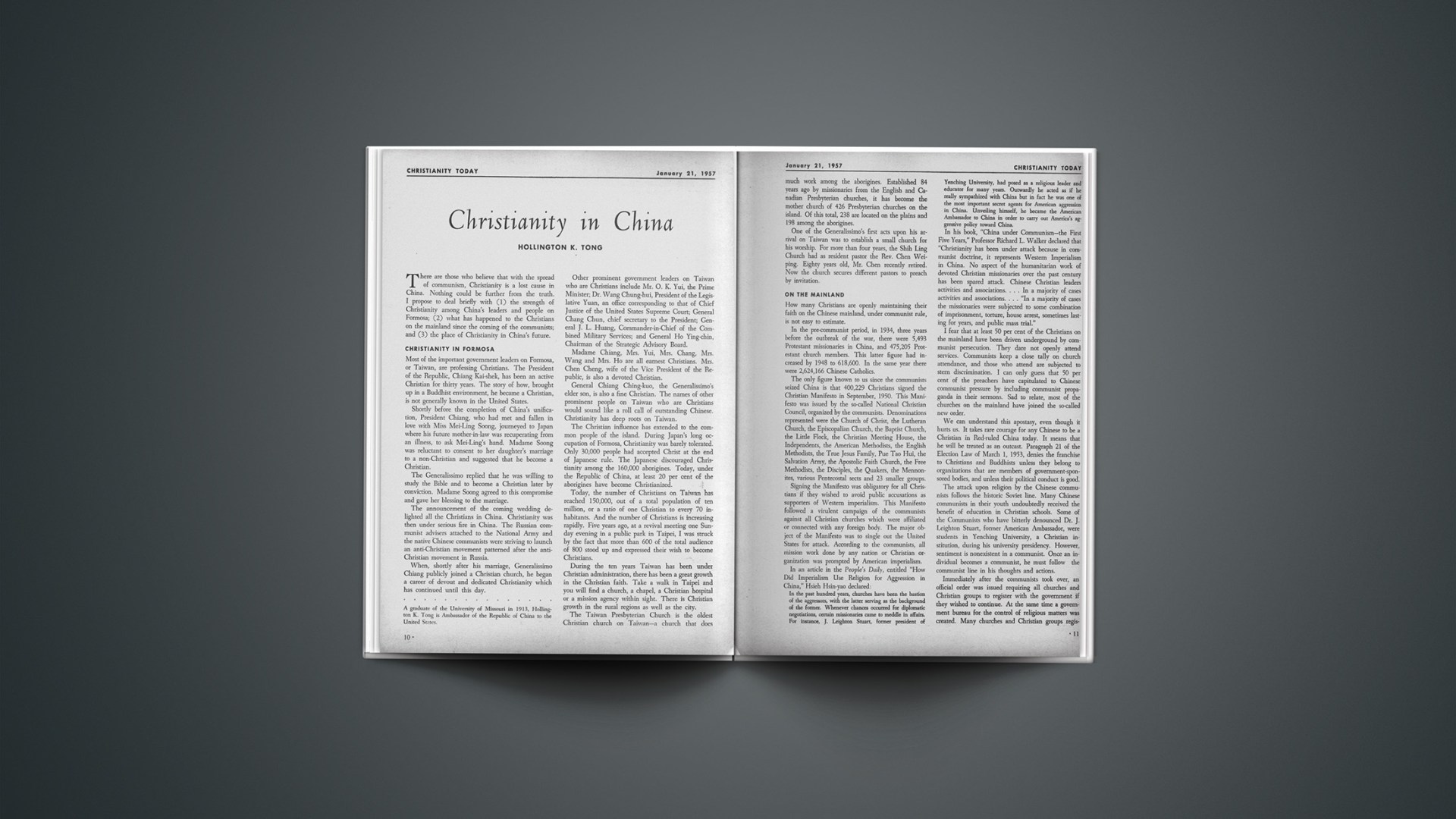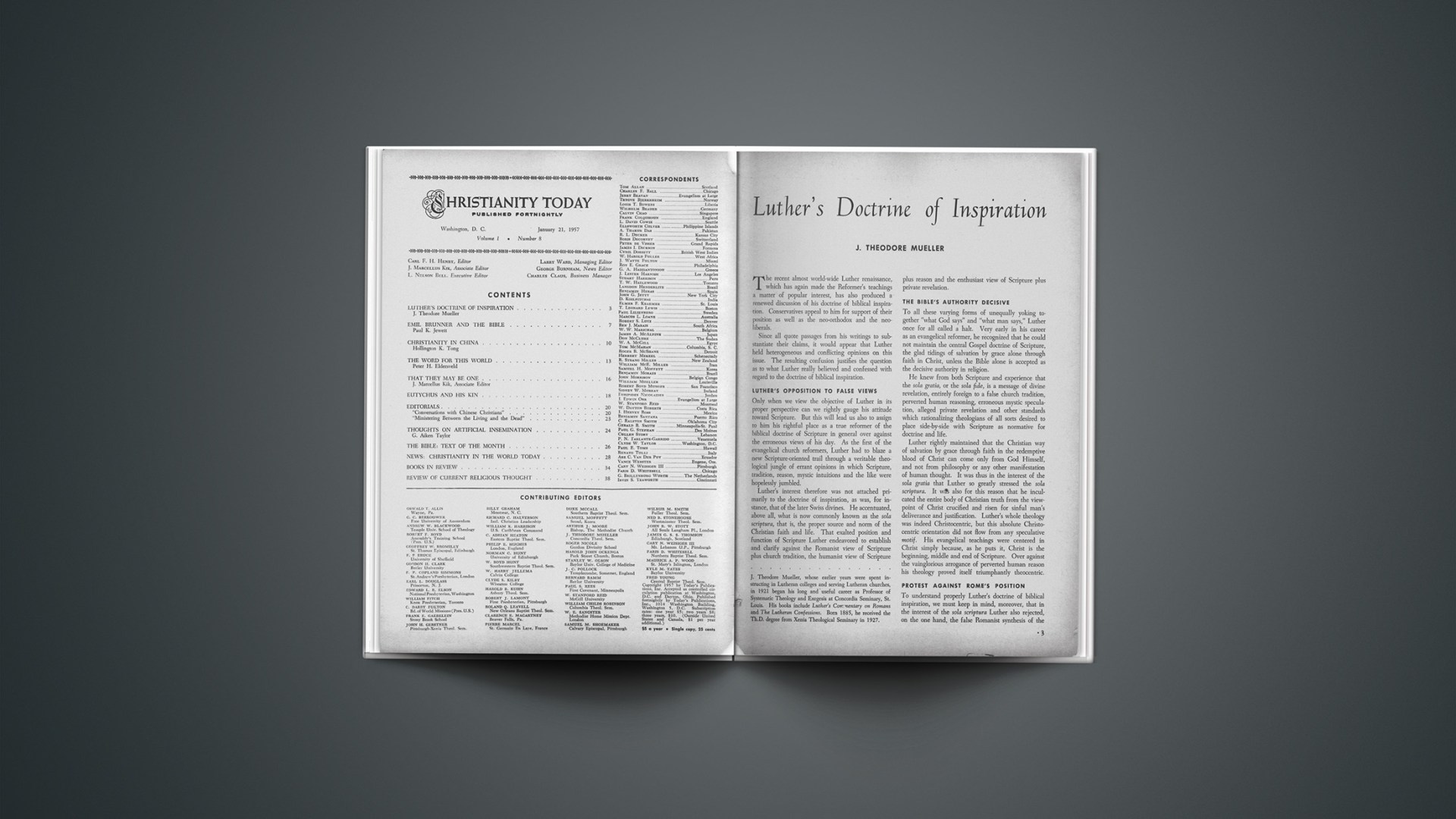NEWS
Christianity in the World Today
(The following excerpts are taken from a letter written to a well-known Christian leader in America by Lieutenant General W. K. Harrison, Commander in Chief, Canal Zone, U. S. Army, and contributing editor ofCHRISTIANITY TODAY.The letter pertains to the controversy over “modernist” ministerial cooperation in the coming New York City campaign of Dr. Billy Graham—ED.)
The questions you raise are important and should be carefully and prayerfully considered.
The first question is, does Billy Graham consistently preach the Gospel?… I have heard Mr. Graham speak and have read some of his writings and not once have I heard him depart from the Gospel. By the word “Gospel” I mean essentially the good news that Christ died for our sins according to the Scriptures, that He was buried, and that He arose from the dead according to the Scriptures (1 Cor. 15:3). He preaches this truth, with its attendant truths, in a positive and sincere manner.…
The basic position in your letter, as I understand it, is that it is a disobedience of God’s commands for Bible-believing, born-again men to associate themselves with modernist churches and church organizations in supporting the dinner of September 17th given in honor of Billy Graham. You cite 2 Cor. 6:14; Ephesians 5:11; 2 Thess. 3:6. Since the purpose of this dinner, sponsored largely by modernists, was to gain support for the coming evangelistic campaign (in New York City) by Dr. Graham in 1957, it seems fair, also, to assume that you object to association with them in that campaign.
I examined the matter on the premises you stated in your letter; that is, that the major group supporting the dinner and the campaign is the modernist Protestant Council of the City of New York.… These men … have preached the social gospel, which is the only gospel they can preach until God speaks to their hearts. They would see some of the fruits of true Christianity, without the living tree itself. Now, after years of Christ rejection and of social gospel, they see failure. They are frustrated. Their religion is losing its adherents. Now they do the only thing really left to them. They turn to the kind of revival ministry that Dr. Graham has, and Moody, and others before him. True, they are not seeking salvation of the soul; they are seeking better morality and environment, better Christianity, but they are seeking them in the only place that they can see hope, in the Christian Gospel. And behind them, unseen behind the big names and ecclesiastical titles, are hundreds of thousands of little people who “don’t know their right hand from their left.” To me, it is a demonstration of God’s infinite love and grace that these unsaved blind leaders of the blind are, in their blindness, turning to the only truth which can lead them and their followers to salvation. In a way, it reminds me of Paul’s vision of the man of Macedonia, who beckoned to Paul to come over and help them. Do you not see the similarity?…
If these modernist groups invite Mr. Graham to preach the Gospel to them and offer to support it with money, effort and prayer, should he refuse? God’s command is to preach the Gospel to every creature. Would you accept an invitation to speak in a modernist church, in a synagogue, in a Roman Catholic church? I would, because I think that every ambassador of Christ would welcome the opportunity to tell the lost of the good news. It seems to me that rather than reject the Macedonian call we should praise God for it.
Now, if it is right for Mr. Graham, or you, or me, or Paul, to accept an invitation by unbelievers to speak the Gospel to them and their flocks, is it right for other real Christians to refuse to associate themselves with this ministry of the Gospel?… The crux of the matter is, what is to be preached and expounded? And that, we know, is the true Gospel of Christ.
In considering the verses which you cite in your letter, I noted first 2 Thess. 3:6 (Now we command you brethren, in the name of our Lord Jesus Christ, that ye withdraw yourselves from every brother that walketh disorderly, and not after the tradition which he received of its). It seems to me quite clear that this verse, taken in its context, verses 6 to 15, refers to persons who are disorderly in their conduct, not working, but busybodies. Yet, even so, these are to be treated not as enemies but as brothers (verse 15). It is a matter of discipline in conduct among believers.
The next verse is Ephesians 5:11, which says, “And have no fellowship with the unfruitful works of darkness, but rather reprove them.” In considering this verse I have examined six translations and three commentaries. The context in which this verse occurs is a condemnation of and warning against fornication, all uncleanness, covetousness (which is idolatry), filthiness, foolish talking and jesting. Those are all sinful and immoral acts … I must say that I see no resemblance between the unfruitful works of darkness mentioned in the context and the present action of the New York modernists in seeking and supporting a true gospel ministry in that city, unless we must take the position that their action is a work of darkness simply and only because they do it. This alternative leads to the following discussion of the third verse you cite, 2 Cor. 6:14.
This verse states, “Be ye not unequally yoked together with unbelievers: for what fellowship hath righteousness with unrighteousness? and what communion hath light with darkness?” I think that this verse is really the one which is relevant to the question … It seems to me that where born-again Bible scholars differ as to the exact meaning and application of this passage, the least they can do is to treat one another in love, remembering that only God is infallible …
In trying to discover from the Bible the application of this verse to myself, I reached the conclusion, first, that it does not mean total separation from unbelievers. This seems clear from John 17:15, 1 Cor. 5:10 and 1 Cor. 10:27. Christ maintained contacts with people generally; many of whom were undoubtedly unbelievers (John 2 is an example). The most obvious example is the fact that during His earthly ministry He included Judas Iscariot with the other Disciples. We are also told to love and do good to our enemies, both of which involve contacts and action. Similarly, we are to remain in the human calling wherein we were called into God’s kingdom and service (1 Cor. 7:17–24). This inevitably involves some form of yoke or association with unbelievers and it is so indicated (Romans 12:1–7). Therefore, the separation commanded in 2 Cor. 6:14–17 is less than total and must have a special character.
It seems to me that the governing word is “unequally” and that its meaning must be understood in the light of righteousness, light, Christ, belief, the temple of God on the one hand as against unrighteousness, darkness, Belial, unbelief, idols, respectively on the other hand, as indicated in verses 14–17. We are to be separate, not necessarily by segregation, but by not touching that which is unclean (verse 17). Admittedly, this separation may, and often does, require segregation in some matters, but not inevitably in others. That is, if we are yoked or associated with unbelievers in objectives, purposes, methods or actions which are contrary to God’s will, commands or character, in other words, which are sinful, the yoke is unequal and must be avoided.
The question next arises as to how we are to determine those objectives which are to be so avoided. In many cases this is no problem because the Bible clearly states them. In others where there is no clear biblical command we are to be guided by the principles of love …
On the basis of the preceding thoughts we can consider the application of 2 Cor. 6:14 to the recent Billy Graham dinner in New York and the revival campaign which it supported.
I doubt if any unbeliever would argue that the objective or purpose is sinful, since the preaching of the Gospel of Christ is commanded by the Bible. The desire of and consequent invitation by the Protestant modernists to receive Mr. Graham’s ministry is certainly to be desired in the interest of saving men’s souls … The use of unbelievers’ money to pay the necessary expenses of the meetings which they themselves seek seems logical and legitimate to me. That modernists may be on the committee or sit on the platform are not in themselves evil, as I see it. I believe any real believer would welcome an invitation to preach the true Gospel to the pastor and unsaved people in a modernist church. Why should he withhold the Gospel which Christ commanded His disciples to preach? Yet, if one accepts such an invitation, he does so from the pastor of the church, and that pastor will sit on the platform and probably take part in the service.
There is in this no recognition of any yoke or Christian fellowship.… Now, I see little difference other than in magnitude between the preaching of the Gospel in a single modernist church and in New York by Billy Graham.
… I think we must all recognize that God has saved many, many persons and multitudes have received the true witness through the ministry of Mr. Graham.… I simply cannot see how such a movement and salvation could be of Satan, which it must be if it is not of God.
If it is of God, then are we, who have been saved through the ministry of the same Gospel, to refuse to cooperate? Are we to hinder or to help? And I ask myself, what kind of Christian testimony is it when we stand before the world in opposition to the preaching of the Gospel to unsaved people who ask for that preaching …?
It may be true that Mr. Graham in his public ministry does not try to put converts into, or keep them out of, certain churches, leaving the decision to the individual. I agree with him that the Sovereign God is able to keep His own and to finish that which He has begun. Who knows that converts who go to a modernist church may not be God’s witnesses in that church until such time as they leave it or are expelled?
Personally, I do not feel that I am in a position to judge others in this respect, although my personal inclination is to worship in the churches which are faithful to the truth as it is given in the Bible. I think the great objective is to try to lead people to salvation, in full confidence that God Himself is the one who saves them, keeps them saved and guides them through life in accord with His plans for them (Eph. 2:10).
I personally hope that all true believers in New York and elsewhere will support the Graham campaign there.…
Worth Quoting
“A man cannot be right with God in his heart until he is right with God in his pocketbook.”—Howard Butt, Texas supermarket executive and lay evangelist.
“A sober teenager with a craving for speed is much better than a drunken adult with liquor banging away at his senses.”—Dr. Robert A. Cook, president of Youth for Christ International.
China Visits Hit
A move by the National Council of Churches of Christ to send a delegation of churchmen to Communist China has been strongly denounced by the National Association of Evangelicals in a letter to Secretary of State John Foster Dulles.
Clyde W. Taylor, Secretary of Public Affairs for NAE, in a letter dated January 8, urged the State Department to “hold its present policy of invalidating all American passports for travel to Communist China.”
He stated:
“If any American Churchmen should be allowed by the communists to visit the mainland of China, it would be only because the communist regime feels that it is in their interest to allow such a visit. It is reasonable to assume that such churchmen would not be allowed to interview those Chinese Christians who have refused to surrender their faith and as a result are in concentration camps, many of them in Manchuria. Nor is it likely that they would be allowed any extensive contact with the leadership of the noncollaborating evangelical segment of the Chinese Christian Church.
“Thus it is quite possible that such a visit would be a serious detriment in several respects. It would be a source of great discouragement to the leadership of the vital evangelical segment of the Chinese Church. It would undoubtedly produce a very unrealistic picture of the situation of the Church in China. It is certainly impossible to get a true picture in a few days of the pressures and persecutions which have spread over several years. This is especially true in light of the fact that the evangelical church in Communist China has grown in spite of persecution. It undoubtedly would be used as a means to bring further pressures on the U. S. Department of State toward the recognition of Communist China. Finally, and this is most important, such a visit would imply U. S. approval of the collaborationist tactics of the leaders of the ‘government-approved’ church in China.”
Worship In Washington
Before the opening of the 85th Congress, President Eisenhower, leaders in various branches of government, including cabinet members and congressmen, gathered for a reverent and impressive communion service in historic National Presbyterian Church.
Participation from the upper echelons of political leadership was the largest since the annual service was inaugurated on the day Congress convened in 1948.
Above such dramatic asides as participation by dignitaries of both party affiliations was the spectacle of national leaders humbling themselves, from the President down, in corporate intercession in the house of God before assuming new duties in the White House and houses of Congress. The annual service, possible under the Presbyterian doctrine of the catholic church, probably could not now be discontinued, because many officeholders who value its spiritual significance would doubtless insist on its repetition.
President Eisenhower sat in his customary pew, and was served the communion elements by Secretary of State John Foster Dulles. Dulles was one of 30 Presbyterian elders serving the elements during the 43-minute gathering.
Because of unfamiliarity with the service among new members of Congress, briefings were held in the church auditorium a half hour early. Those serving included Secretary of the Army Wilber M. Brucker, Paul W. McCracken of the Council of Economic Advisers, Assistant Attorney General Perry W. Morton, five elders in the Senate (Martin, Pa.; Dirksen, Ill.; Ervin, N. C.; Stennis, Miss.; Scott, N. C.) and five elders from the House (Beamer, Ind.; Pillion, N. Y.; Simpson, Pa.; Fountain, N. C.; Laird, Mich.).
President Eisenhower came with his assistant, Sherman Adams, and Press Secretary James C. Hagerty. (Former President Truman, also without the first lady, usually attended with a considerable group of aides.)
The house of God is the one assembly where the arrival of the President goes unmentioned, and the people remain seated as he joins the worshippers. At the close of the service, they remain in their pews until the President is escorted from the church by the host minister.
Leaders in the service, no less than participants in the pews, contributed their share of interest. Dr. Edward L. R. Elson, the President’s pastor and contributing editor of CHRISTIANITY TODAY, offered the prayer for divine guidance and blessing upon all in authority. The Moderator of the Presbyterian Church, U. S. A., David W. Profitt, who was elected to that post over Dr. Elson in a “layman’s year,” acted as chief elder. The customary exhortation or invitation before the serving of the elements was omitted. Dr. Eugene Carson Blake, president of the National Council of Churches, presided.
The service is sponsored each year by the General Assembly of the Presbyterian Church, U. S. A., in cooperation with the N. C. C. and Washington Federation of Churches. As a symbol of merger negotiations now in progress, Dr. Robert W. Gibson, Moderator of the United Presbyterian Church, was among those officiating. In recent years, before the Presbyterian Church, U. S. (Southern), rejected a merger proposal, its Moderator, likewise, was asked to officiate at the Lord’s table.
—C.F.H.H.
Digest …
► Dr. Duke K. McCall, president of Southern Baptist Theological Seminary, named chairman of Accrediting Commission of American Association of Theological Schools.… Brig. Gen. Lester Maitland, first man to fly non-stop from U. S. to Hawaii, ordained deacon in Protestant Episcopal Church, Iron River, Michigan.
► Chicago management consultant firm—Booz, Allen and Hamilton—hired to study ways of improving effectiveness of Southern Baptist Convention agencies.… Annual budgets of 155 churches between Windsor and Ottawa, Canada, boosted from $1,000,000 to $2,500,000 in biggest Protestant stewardship campaign ever undertaken in the country.
► Dr. Carrol A. Wise, professor of pastoral psychology and counseling, Garret Biblical Institute, Evanston, Ill., elected president of board of governors of Council for Clinical Training, Inc., with 42 accredited training centers.
► C. E. Bryant, public relations director of Baylor University, named director of publications of Baptist World Alliance.… University of Chicago Press announces publication date of January 26 for first English translation of Walter Bauer’s Worterbuch, formerly available only in German to Greek New Testament students.
► Each family belonging to Hillcrest Methodist, Bloomington, Minn., receives key to front door of church.
Aroused Broadcasters
Unusual interest is being shown in the 14th annual convention of the National Religious Broadcasters, Inc., scheduled for the Mayflower Hotel in Washington, D. C., January 30–31.
In what promises to be the largest and most representative gathering in the history of the NRB, there will be two main concerns:
*A new strategy for the preservation of the right to purchase radio-television time for the broadcasting of the Gospel.
*Development of more effective religious broadcasting techniques.
Special interest in the convention resulted from the official pronouncement of the Broadcasting and Film Commission of the National Council of Churches against the purchase of radio and television time for the broadcasting of religion. (The National Council apparently wants to control the allocation of broadcast and film time.)
Members of the NRB, affected by the active implementation of this policy, broadcast on 80 per cent of the nation’s radio and television stations. It is estimated that their annual budgets are in excess of $10,000,000, most of which is spent for broadcasting time.
Representatives of the religious broadcasting field who will address the convention are Dr. Eugene R. Bertermann, executive director of The Lutheran Hour; Dr. Theodore H. Epp, head of The Back to the Bible Hour; Dr. Peter Eldersveld, The Back to God Hour of the Christian Reformed Church; Dr. Clarence W. Jones, president of the World Radio Missionary Fellowship and director of Station HCJB, “Voice of the Andes.”
Faith On Campus
The 2,360 delegates to the Southern Baptist Student World Missions Congress in Nashville, Tennessee, signed commitment cards pledging themselves to relate their faith “integrally” to campus life.
An estimated 200 of the delegates also pledged themselves to full-time service as missionaries or in other Christian vocations. They responded to a call given by Dr. Baker J. Cauthen, executive secretary of the Southern Baptist Convention’s foreign mission board.
Dr. Cauthen said he believed a chain reaction would develop when the delegates returned to their campuses, with “many other recruits” coming from the influence of the Congress.
Exclusive Right
The U. S. State Department has announced that the Republic of Colombia is reconsidering an order banning a substantial area of the country to Protestant missionaries.
“Since 1951,” the Department said, “there have been numerous incidents of violence against American Protestant missionaries and the destruction of American mission property.”
Under terms of a so-called Mission Agreement signed by the government of Colombia on January 29, 1953, the Roman Catholic Church was given the exclusive right to proselytize and carry on religious and educational work in “a considerably expanded area, believed now to constitute between two-thirds and three-fourths of the national territory.”
A number of Protestant missions were closed as a result of the order.
The Department added:
“The Colombian government has given considerable study to the problem, and has indicated that it hopes it will be possible to re-open the closed churches in the near future.”
Major Advance
Speakers at the eighth annual meeting of the Evangelical Theological Society in Philadelphia described the Dead Sea Scrolls as “a major advance in biblical scholarship.”
Dr. R. Laird Harris of Covenant Seminary, St. Louis, Missouri, said the scrolls have given “new importance and value” to the Septuagint, or first Greek translation of the Old Testament.
Dr. Ned B. Stonehouse, dean of Westminster Seminary, Philadelphia, was elected president of the society. He succeeds Dr. Roger B. Nicole of Gorden Divinity School, Boston, who presented a paper on “Opportunities and Perils of Evangelical Scholarship.”
Treasures On Earth
Clergymen will have to lay a little more money aside in 1957 to pay their self-employment tax under social security coverage.
The rate is going up from 3 to 33/8 per cent this year, with the tax assessed against the first $4,200 of a clergyman’s income. This raises the maximum payment from $126 to $141.75.
Since the tax is due in a lump sum, many clergymen follow the plan of laying aside a specific amount each month. The payment must be made at the time personal income tax returns for the year are filed. These are due on April 15 of the year following the end of the calendar year. The higher tax, therefore, will not be paid until April 15, 1958.
In return for the increased tax, clergymen who become completely disabled because of accident or illness may retire on full social security payment at any time after the age of 50 and wives will be eligible for benefits at age 62 instead of 65.

